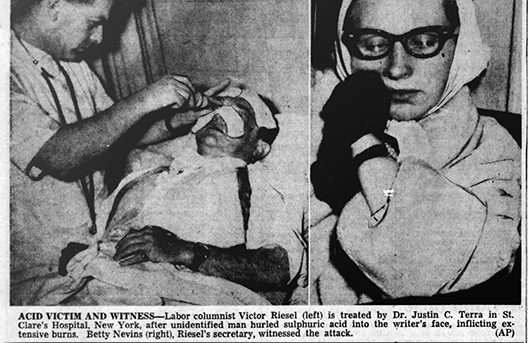Is This Any Way to Run a City’s Schools?
Leaked CTU Proposals Won’t Do Anything to Improve Schools’ Poor Performance

Author David Witwer (2014) wrote about “The acid attack on Victor Riesel and fears of labor racketeering in Cold War America,” in the publication Labor History:
It was a brutal attack that shocked the nation. The syndicated newspaper columnist Victor Riesel was leaving Lindy’s restaurant in Manhattan in the early morning hours of 5 April 1956, when a hired thug threw a vial of concentrated sulfuric acid into his face. The liquid splashed directly into Riesel’s eyes, searing them. “After a momentary, very momentary, surprise and shock.” he later recalled, “there came the sharpest, most painful burning I have felt.” The acid concentration was so strong that the runoff disintegrated Riesel’s tie. Moreover, even later, when law enforcement arrived at the scene, a drop that fell from the columnist’s face burned a hole through one policeman’s coat. Hospitalized for weeks, enduring terrible pain. Riesel was left permanently blind.
Newspaper reports immediately linked the attack to Riesel’s crusading efforts to curb communist infiltration and racketeering in the labor movement. “In the fourteen years that he has been hammering away at Communists and racketeers in labor’s ranks.” a front-page article in the New York Times asserted, Riesel “has received scores of threatening letters and telephone calls.” But the “pint-sized,” “voluble” columnist with a “writing style that resembles Mickey Spillane’s” had shrugged off these threats, the Times reported, and “refused to be deterred from his anti-racket activities.'”
Victor Riesel, a nationally syndicated labor reporter and radio commentator who died January 4, 1995, never directly opposed compulsory union memberships, but Right to Work supporters owe much to him. Mr. Riesel refused to let his personal friendship with long-time AFL-CIO chief George Meany prevent him from reporting accurately on union-boss corruption, Organized Labor’s ties with gangsters and Communists, and the use of members’ forced dues for politics.
Like all too many workers who challenge the union hierarchy, Riesel himself became a victim of union violence. Hours after Riesel denounced the mob-infiltrated union hierarchy of New York’s garment district in a 1956 radio broadcast, a street tough threw acid in the reporter’s face, permanently blinding him. Years earlier, Riesel’s father had been brutally beaten and murdered by mobsters who ran a union.
An FBI probe later found that union racketeers, determined to terrorize Riesel and others into silence, had hired the assailant.
“The attack on me was an attack the entire free press, challenging its right to expose crime and injustice,” Riesel later wrote. “In hitting me, the underworld was thumbing its nose at the community and the forces of law and order.”
Blindness Couldn’t Stop Riesel From Shedding Light On Big Labor Abuses
Big Labor thugs may have taken his sight, but they couldn’t silence Riesel’s voice. He continued attacking union bosses’ abuse of workers’ rights in his radio commentaries and syndicated column, which at one time ran in nearly 350 papers, until his retirement in 1990.
“Victor’s exposes of union officials who collaborated with Organized Crime and Communist agents helped the National Right to Work Committee mobilize public opposition to forced unionism in the ’50s and ’60s,” said then-Committee President Reed Larson.
“But it was Victor’s detailed reporting, in later years, on the operations of Big Labor’s forced-dues political machine which only someone with his inside connections could accomplish that was his greatest contribution to the Right to Work cause.”
As Riesel wrote in 1976, ” … [During election years,] the AFL-CIO building becomes an instant national party headquarters – easily a match for the national committees of the Democratic and Republican parties … ”
Aided by a team of cost accountants, Riesel estimated that union bosses spend eight to 10 times their publicly reported campaign contributions on unreported “soft money” contributions – which are financed primarily by workers’ forced union dues, “Soft money” donations, as Riesel pointed out in another column, pay above all for “staff time — meaning union officials who are assigned to campaigns for months on end l while remaining on the union payroll],” and also “printing costs, postage, telephone, and various other support services financed entirely out of compulsory union dues and fees.” When the union bosses denounced his reports on their politicking, Riesel, true to form, refused to back down: “I know my estimates [of union-boss campaign spending] are right… Let them open their books if they say they [aren’t.]”
Of course, the union bosses never answered Riesel’s challenge, and continue to fight all efforts to open their books
In 2016, union bosses spent $1.7 billion in forced-dues “soft money” to re-elect Big Labor incumbent congressional cronies on the ballot and Hillary Clinton for President, despite strong public revulsion toward Big Labor politicians.
“Victor’s reports, of course, didn’t shut down the union political machine,” said Reed Larson. “But the information he unearthed has helped the Committee successfully mobilize public resistance to a series of phony campaign ‘reform’ bills that would have further enhanced the union bosses’ forced-dues political clout.”
Although Right to Work supporters had many disagreements with Victor over the years, we salute this honest and courageous journalist, who often lived up to his self-description as a ‘friend of the’ worker, ‘” Larson conclude
Click here to sign the congressional petition to pass the Freedom from Union Violence Act.

Leaked CTU Proposals Won’t Do Anything to Improve Schools’ Poor Performance

Wherever Big Labor wields the power to collect forced union dues, union bosses funnel a large share of the confiscated money into efforts to elect and reelect business-bashing politicians. Employment growth tends to lag as a consequence.

Members Insist They Keep Pro-Right to Work Campaign Promises